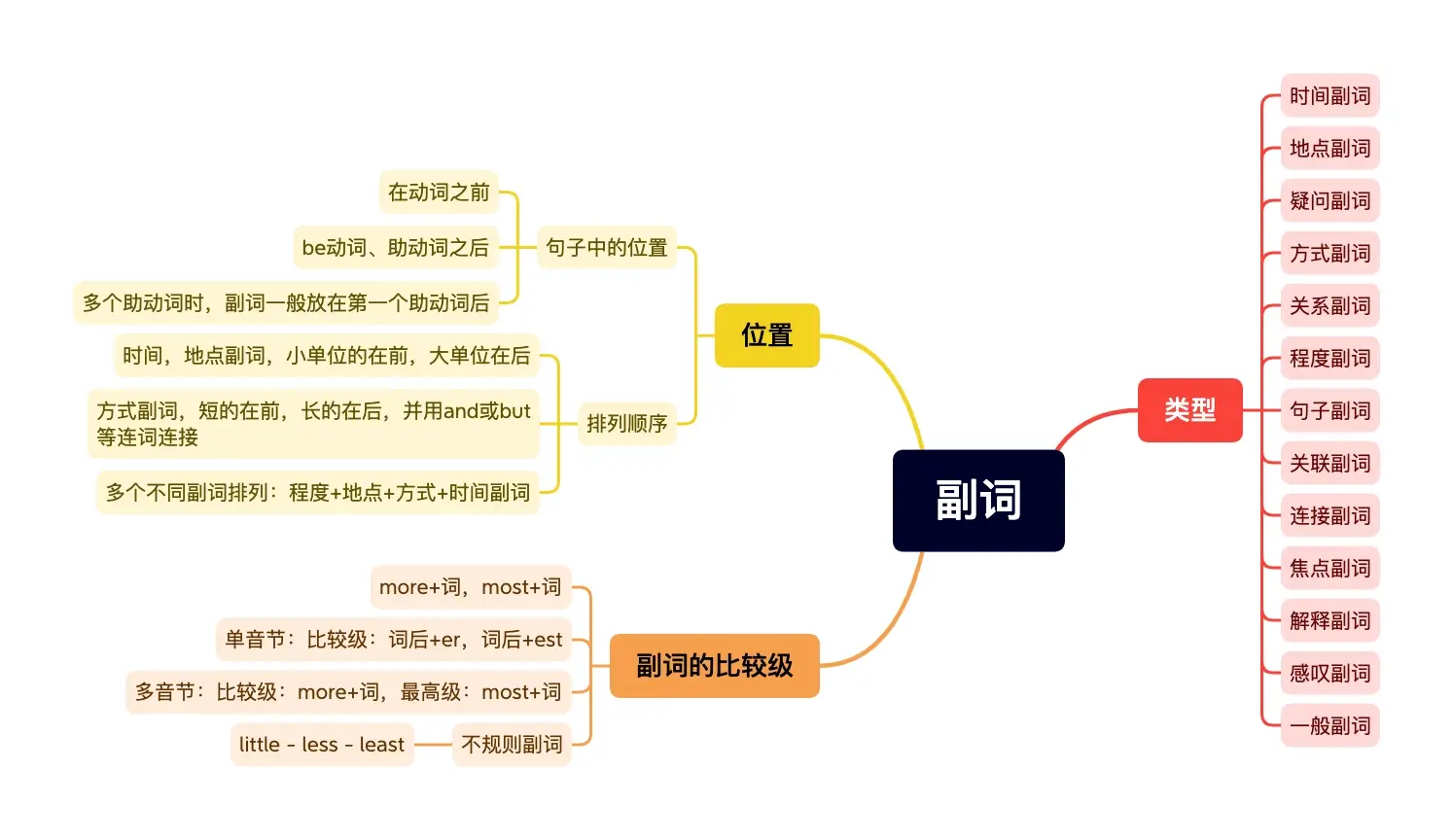接上篇:英语基础语法是英语学习中很重要的一环,扎实的基础语法可以帮助大家在英语学习的道路上节省时间的同时,还有助于提高英语学习兴趣,主要的是,对于那些准备英语考试朋友来说,英语基础语法扎实的同学更加能够把我大篇幅英语阅读的效果和阅读信息获取,前面和大家分享了:英语基础语法:副词分类和副词的基本用法(1),今天我们接着分享英语基础语法相关内容。

副词分类和副词的基本用法(2)
一般副词
从时间、地点、方式、程度、语气等方面对句子进行修饰文章源自西贝博客-https://qinghe.me/adverbs.html
- Surprisingly, Shaya was given the book.
- 令人惊奇的是,这本书给了沙亚。
有些副词可以直接放在动词的后面文章源自西贝博客-https://qinghe.me/adverbs.html
- the discussion afterwards
- 后来的讨论
文章源自西贝博客-https://qinghe.me/adverbs.html
方式副词
1、一般都是用来用来描述动作的,其中绝大多数由形容词加后缀 -ly 构成文章源自西贝博客-https://qinghe.me/adverbs.html
- angrily 生气地
2、也有的由分词 + ly 构成文章源自西贝博客-https://qinghe.me/adverbs.html
- threateningly 威胁地
 文章源自西贝博客-https://qinghe.me/adverbs.html
文章源自西贝博客-https://qinghe.me/adverbs.html
位置副词
- upstairs 楼上
- downstairs 在楼下
时间副词
- yesterday 昨天
- this morning 今天上午
- a week ago 一周前
频度副词
频度副词表示动作发生的次数文章源自西贝博客-https://qinghe.me/adverbs.html
- I'v never been out this late before.
- 我从来没在外面待到这么晚。
程度副词
口语中经常使用右侧的词文章源自西贝博客-https://qinghe.me/adverbs.html
按照程度的强弱划分,可分为:
1、强
very 非常 | quite 相当、十分 | too 太、非常 | greatly 大大地、非常 | highly 非常、高度地 | enough 相当、足够地 | extremely 非常地、极其 | perfectly 完全地、十足地 | totally 彻底地 | utterly 完全地 | wholly 完全地 等
2、中
rather 宁可、相当 | fairly 相当地、简直 | pretty 相当地 等
3、弱
a bit 有点 | a little 略微 | slightly 稍稍、轻微地 等
- His illness is far more serious than we thought.
- 他的病比我们想像的要严重很多。
疑问副词
这类副词有when、where、why、how,用于引出疑问句
- How do you study?
- 你如何学习的?
关系副词
这类副词有when、where、why等,用于引导定语从句
- I will never forget the days when we stay together.
- 我永远也忘不了我们一起的日子。
连接副词
这类副词用来连接句子、分句或从句,可表示各种关系
1、表因果
so 因此 | consequently 因此 | hence 因此 | therefore 所以 | thus 因而
- It snowed heavily all day, and so we had to stay at home.
- 大雪下了一天,因此我们不得不待在家。
- 2、表递进
furthermore 并且 | besides 另外还 | moreover 而且
- She lost the chance. Furthermore, she was very regretful that she left.
- 她错失良机,并为她的离开感到后悔。
3、表转折或对比
however 但是、然而 | none the less 然而 | nevertheless 然而
- There is no time, however, the book remains unfinished.
- 已经没有时间了,但这本书还没有完成。
4、表条件
otherwise 否则
- You have to study hard, otherwise, you can not pass this exam.
- 你得努力学习,否则,你不能通过这次考试。
5、表时间
then 然后 | afterwards 后来 | later 然后 | next 下一步
- Come here early, then, you can go with me.
- 早点来,然后,你可以和我一起去。
6、表仍然
still 仍然 | yet 还
- Do you still have Julie's phone number?
- 你还留着朱莉的电话号码吗?
焦点副词
焦点副词是对所修饰的词进行强调,使之成为人们关注的焦点的副词
包括:only 只、仅仅 | alone 独自地、单独地 | also 也、同样 | even 甚至、即使
- I rang up just to say hello.
- 我打电话只是问候一下。
句子副词
句子副词用于修饰句子,表示说话人的观点和看法,通常位于句首
包括:actually 实际上、事实上 | certainly 无疑地、确定地
- Clearly he didn't say so.
- 显然他没有这样说。
解释副词
这类副词用以引出例子或列举
for example 例如 | for instance 例如 | namely 也就是说
- For instance, we used to have hobbies.
- 例如,我们都曾经有自己的爱好。
感叹副词
- How time files!
- 时间过得真快。
缩合连接副词
这类副词主要由先行词和关系副词缩合而成,多用以引导名词性从句
when(the time when)、where(the place where)、why(the reason why)、whenever(any time when)、wherever(any place where)、however(no matter how) 等
- The door remained locked however I tried to open it.
- 无论我费多大劲想打开它,门仍然锁着。



评论